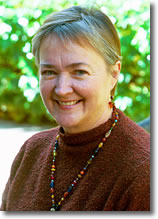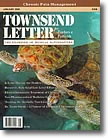Minnesota Offers Holistic CAM Education
 Mary Jo Kreitzer, PhD, RN, an associate professor of nursing at the
University of Minnesota, started out as a pediatric nurse practitioner. "During
that period I became aware that the children and parents I saw were
using a number of complementary approaches I had learned nothing about
in school. They seemed to be very knowledgeable about their own bodies
and their health needs, so I became interested in learning more about
complementary therapies." Mary Jo Kreitzer, PhD, RN, an associate professor of nursing at the
University of Minnesota, started out as a pediatric nurse practitioner. "During
that period I became aware that the children and parents I saw were
using a number of complementary approaches I had learned nothing about
in school. They seemed to be very knowledgeable about their own bodies
and their health needs, so I became interested in learning more about
complementary therapies."
The nursing profession has had a holistic orientation from its very
beginning, Kreitzer says. "It was Florence Nightingale, the
founder of modern nursing, who wrote that the role of the nurse was
to help patients attain the best possible condition so that Nature
could act and self-healing could occur." Over the past ten years,
U. S. nursing programs have begun to reflect more holistic, integrative
content. For example, one of the nursing competencies defined by the
American Association of Colleges of Nursing is the ability to perform
a holistic assessment of the individual across their life span, including
spiritual, social, cultural, and psychological factors. "Today,
nurses are expected to be aware of complementary modalities and their
usefulness in promoting health," Kreitzer says.
When she became Director of Nursing Practice and Research at the University
of Minnesota Hospital and Clinic, Kreitzer discovered even more reasons
to learn about complementary methods. "Again, I saw that many
hospitalized patients were using these complementary modalities and
felt strongly about them. I became interested from a research perspective,
and discovered there is a substantial evidence base to support many
of these approaches."
Today, Kreitzer serves as the principal investigator on a $1.6 million
CAM curriculum grant funded by the National Center for Complementary
and Alternative Medicine (NCCAM). She is co-principal investigator
on a five-year, $2.1 million clinical study, funded by the National
Institute for Nursing Research, to look at the benefits of "mindfulness
meditation" for solid organ transplant patients, and she's
also co-principal investigator for a study of an integrated residential
treatment program for women with eating disorders, funded by BlueCross/Blue
Shield Minnesota.
Center for Spirituality and Healing
In 1995, Kreitzer founded the university's Center for Spirituality
and Healing, which educates health professionals about integrative
medicine, conducts research, and helps develop care models that are
attentive to body, mind and spirit. It grew out of her efforts to improve
patient care at the hospital. "We wanted to do a better job
of patient care, and we realized there was a growing interest in complementary
approaches. In addition, as Minnesota became more diverse, we needed
to look at varying cultural approaches to care." At first, the
center focused on informal education and patient care. There was so
much interest that Kreitzer approached Frank Cerra, MD, the senior
vice president of the academic health center, and suggested a couple
of courses on integrative medicine. "He responded, 'this
is much bigger than a couple of courses. This is about the transformation
of healthcare.' That was how we started out."
Today the Center for Spirituality and Healing has a five-year grant
from NCCAM to integrate CAM information into education within the university's
Schools of Medicine, Nursing, and Pharmacy. It's also offering
a graduate minor in Complementary Therapies and Healing Practices to
those studying for a master's or PhD degree in a wide range
of subjects. Each semester about 250 students enroll in this program,
from disciplines such as sociology, psychology, social work, architecture,
counseling, and administration, as well as nursing, medicine, and pharmacy.
About 50 members of the university faculty offer courses in the graduate
minor. Linda Halcon, PhD, MPH, BSN, RN, is an assistant professor in
the School of Nursing and a faculty member of the Center for Adolescent
Nursing. She teaches two courses as part of the graduate minor: "Clinical
Aromatherapy" and "Spirituality and Resilience." Karen
Lawson, MD, teaches family medicine on the university faculty, directs
Integrative Clinical Services at the center, and also offers a course
in Shamanism.
An additional 50 community-based faculty participate in research and
lectures. For example, Patricia Culliton, MA, LAc, director of the
Alternative Medicine Division at Hennepin Faculty Associates, teaches
a required introductory course in complementary therapies and healing
practices.
Kreitzer found that quite a few students wanted to take the graduate
minor, but already had graduate degrees. To meet this need, in fall
2004 the Center started offering a graduate certificate. This permits
students to self-design a program to match their own special interests.
In addition, the Center offers continuing education courses, such as
a popular weekend or day-long health professional renewal course called
the Inner Life of Healers. In 2004, it started a continuing education
program to train holistic health coaches. It also offers a variety
of online modules for healthcare professionals, including "Spirituality
in Healthcare," "Traditional Chinese Medicine," and "Culture,
Faith Traditions and Health."
New Website Offers Consumer Information
The Center's latest effort is a website for consumers. "Taking
Charge of Your Health," with content written by Kreitzer and
other members of the university faculty, will help consumers find reliable,
balanced information to improve their health and well-being. It includes
modules on ways to find healthcare providers who meet your needs, communicate
more effectively with healthcare providers, and find and evaluate health
information on the Web. One section explores options in healing, including
complementary therapies. There are many references, and a truly wonderful
list of links for additional information.
Consumer education is important, says Kreitzer, because so many diseases
are related to lifestyle. "Drugs, doctors, and hospitals are
not the solution for the growing problems associated with lack of physical
activity, poor diet, obesity, smoking, and stress," she says. "Educating
consumers is a natural extension of our work, because the changes we're
seeing in healthcare go beyond complementary methods of care. Just
as much, these changes are shaped by people who want to take personal
responsibility for their own health and wellness."

Resources
For more information about the Center for
Spirituality and Healing, their course offerings, and "Taking Charge of Your Health," visit
www.csh.umn.edu.

Elaine Zablocki is the editor of CHRF
News Files, a bimonthly emailed newsletter about the emerging
integrative medicine industry, published by the Collaboration for
Healthcare Renewal Foundation.
|





 Mary Jo Kreitzer, PhD, RN, an associate professor of nursing at the
University of Minnesota, started out as a pediatric nurse practitioner. "During
that period I became aware that the children and parents I saw were
using a number of complementary approaches I had learned nothing about
in school. They seemed to be very knowledgeable about their own bodies
and their health needs, so I became interested in learning more about
complementary therapies."
Mary Jo Kreitzer, PhD, RN, an associate professor of nursing at the
University of Minnesota, started out as a pediatric nurse practitioner. "During
that period I became aware that the children and parents I saw were
using a number of complementary approaches I had learned nothing about
in school. They seemed to be very knowledgeable about their own bodies
and their health needs, so I became interested in learning more about
complementary therapies."